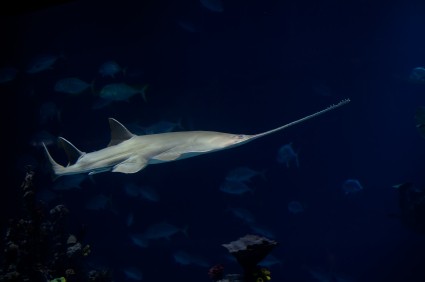Australia Joins Unprecedented Effort for International Shark and Ray Trade Measures

Native sawfish among eleven shark and ray species proposed under wildlife treaty
Australia has joined 37 other countries in proposing protections for shark and ray species under the Convention on International Trade in Endangered Species (CITES). Australia is pursuing an end to all commercial international trade in the Critically Endangered freshwater sawfish through CITES Appendix I. Less restrictive trade measures through Appendix II are being proposed by various other CITES Parties for the oceanic whitetip shark, three species of hammerheads, porbeagle shark, both manta rays, and three freshwater stingrays. CITES Parties will debate and vote on listing proposals in March 2013 in Bangkok.
“We are pleased that Australia is among the 38 countries proposing to use CITES to address pressing trade-related threats to sharks and rays,” said Ania Budziak, Associate Director for Science and Policy at Project AWARE. “Divers are uniquely positioned to highlight the economic benefits of ensuring healthy populations of these iconic species.”
CITES is an international agreement for monitoring and controlling international trade to ensure it does not threaten species’ survival. While CITES Appendix I effectively bans international commercial trade, Appendix II prompts export permits to ensure international trade is legal and sustainable.
In 2007, all seven sawfish species were listed under CITES. All but the freshwater sawfish were added to Appendix I, due to Australian interest in trading live animals (under Appendix II). In 2011, the Australian government concluded that take from their freshwater sawfish population for export might be detrimental to the recovery of the species.
The freshwater sawfish has been reported in rivers and coastal waters in Australia, Southeast Asia, and southeastern Africa. All sawfish species are classified as Critically Endangered by the International Union for Conservation of Nature (IUCN). Sawfish face myriad threats; trade in their valuable fins for shark fin soup and their long, toothed snouts for curios has contributed to declines.
“The strongest protections at all levels are needed to ensure the survival of sawfishes,” Alexia Wellbelove, Senior Program Manager for Humane Society International. “We urge all CITES Parties to support Australia’s freshwater sawfish proposal to strengthen existing international safeguards for all sawfish species and offer new hope for bringing these remarkable animals back from the brink of extinction.”
Brazil, Costa Rica, Mexico, Ecuador, Honduras, Croatia, and the 27 Member States of the European Union have proposed CITES Appendix II listing for scalloped, great, and smooth hammerhead sharks. Colombia. The U.S. and Brazil have joined Colombia’s effort to also list the oceanic whitetip shark. All four of these shark species can be found off Australia.
“The global trade in shark fins for soup is a major factor in the worldwide decline of most shark species, particularly hammerheads and oceanic whitetips,” said Sonja Fordham, President of Shark Advocates International. “Support from Australia will be key to the success of the shark proposals at the CITES meeting, and – in turn – to a brighter future for several globally threatened species.”



